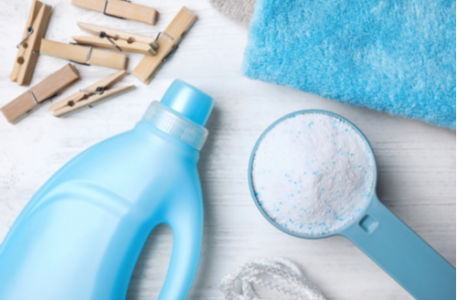
6 Things to Know About Today’s Laundry Detergent Options
Glance down the laundry aisle at most major retail outlets, and it’s easy to assume that detergent products are nearly identical. Dozens of similar bottles stacked together make it seem that the only decision is size and scent.
But take a closer look, and you’ll realize that laundry detergents can be complex buying decisions, particularly if you’re concerned about making healthy and sustainable choices—and don’t have a degree in chemistry!
Not sure where to start? Here are six helpful tips.
1. Soaps versus detergents.
Soaps and detergents contain different ingredients. Detergents use synthetic chemicals, such as sulfates, optical brighteners, dyes, and perfumes. However, soaps are made from naturally-derived ingredients like oils, glycerin, lye, animal fats, and fragrance oils.
Because they use bio-degradable ingredients, soaps are considered more environmentally friendly, but they may not be as effective in fighting stains or removing odors. Soaps are also preferable for people with sensitive skin.
It’s important to note that many soaps are labeled as detergents and vice versa. So the only way to know which you’re buying is to read the ingredient label.
2. Liquids versus powder.
Powder detergents have taken a back seat to liquid products in the U.S., although powder still dominates in many other countries.
Powder detergent tends to be less expensive, excels at cleaning and brightening clothes, especially in warm or hot water, and is often sold in recyclable containers.
In contrast, liquid detergent excels at pretreating stains, dissolves easily in all water temperatures, and it’s particularly effective on greasy stains.
3. Convenience considerations.
Laundry pods are one of the most convenient forms of detergent. They’re highly effective cleaners and aren’t as messy as liquids or powders, but they’re also the most expensive choice. Plus, there’s no way to adjust for smaller loads.
Are pods eco-friendly? Since they’re concentrated, pods are preferable to heavy, liquid detergents, primarily made of water. But most pod products are packaged in large plastic containers. Also, there’s an ongoing debate over polyvinyl alcohol (PVOH), the thin plastic coating that seals each pod and dissolves in water.
4. Labels can be misleading.
Remember, manufacturers’ labels are written by marketers tasked with making their products appeal to buyers. Therefore, they may use terms highly subject to interpretation, like “natural.”
For example, a product can be described as “plant-based” but can contain a substantial percentage of synthetically-derived materials. Check the list of ingredients to be sure!
Also, some products display certification seals like the Safer Choice label, the USDA Organic Seal, or The Vegan Society's trademark. Each of these certifications reflects different standards and requirements.
5. DIY alternatives.
Consider making your own budget-friendly and natural laundry products! You’ll find various recipes online for powder and liquid products.
One of the simplest powder options involves grating a natural soap bar (such as Fels-Naptha, or Dr. Bonner’s Pure Castile Bar Soap). Then, mix one part of the grated soap with two parts of Borax and two parts of washing soda (sodium carbonate). Mix thoroughly. Add three tablespoons to a regular washing machine load, but only one tablespoon to high-efficiency machines.
You might need a synthetic detergent to remove tough stains, but this simple recipe is adequate for most routine wash loads.
6. More eco-friendly options.
Two of the most prominent environmental concerns with laundry detergent are the chemicals they contain and their use of plastic packaging. Fortunately, new and improved products continuously appear, although they’re not always easy to find in stores.
For example, Seventh Generation’s Zero Plastic line includes powdered laundry detergents, and Ecos offers plastic-free laundry detergent sheets. You can easily find dozens of other similar alternatives online.
If you prefer liquid detergents, one easy switch is to a concentrated liquid product. That way, you can purchase smaller bottles less frequently. Mrs. Meyer’s Clean Day collection and Method products are two widely available examples.
Better yet, you might be able to refill your own container! For example, Common Good has refill stations in several major metropolitan areas where you can buy their bulk laundry detergent, hand soap, dish soap, and all-purpose cleaner. Bring whatever plastic or glass container you prefer.
Also, you may be able to find other options with an online search for “where to refill laundry detergent in (name of your area)”.
